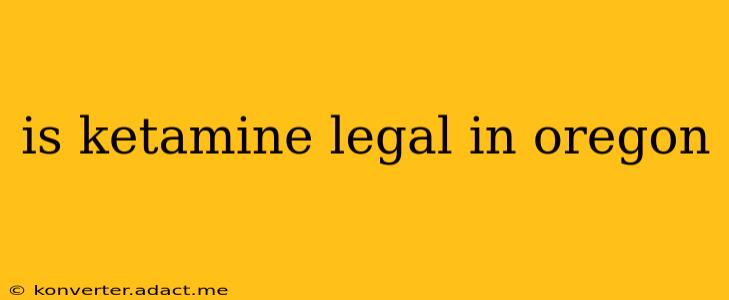Ketamine's legal status in Oregon is complex and depends heavily on the context of its use. While it's a Schedule III controlled substance under federal law, meaning it has a high potential for abuse, Oregon has taken a unique approach to its regulation, particularly concerning its use for therapeutic purposes. Let's break down the key aspects.
Is Ketamine Legal for Recreational Use in Oregon?
No. Like in all other states, recreational use of ketamine is illegal in Oregon. Possessing, using, or distributing ketamine without a valid prescription is a criminal offense, punishable by fines and/or imprisonment. The penalties can vary depending on the amount of ketamine involved and any prior offenses.
Is Ketamine Legal for Medical Use in Oregon?
Yes, but with strict regulations. Ketamine is a legitimate anesthetic used in medical settings for various procedures, including pain management and sedation. However, its use is strictly controlled. Only licensed medical professionals can prescribe and administer ketamine, and it must be used within the context of established medical practices. Oregon follows federal guidelines regarding the prescribing and dispensing of controlled substances, including ketamine.
Is Ketamine Legal for Treatment of Depression and Other Mental Health Conditions?
This is where the situation gets more nuanced. While not explicitly legalized for this purpose in the same way as some other medications, ketamine's use in treating treatment-resistant depression (TRD) and other mental health conditions is gaining traction. However, its use is still under close scrutiny.
-
Off-label use: Currently, many psychiatrists in Oregon may utilize ketamine for TRD and other mental health conditions off-label. This means it’s used for a purpose not specifically listed on the drug's FDA-approved labeling. While legal, this practice requires careful adherence to ethical guidelines and best medical practices. The physician must justify the use of ketamine based on the patient's specific needs and circumstances.
-
Clinical settings: Ketamine for mental health treatments is usually administered in carefully controlled clinical settings, under close medical supervision. This is crucial to manage potential side effects and ensure patient safety.
-
Specialized Training: Doctors using ketamine for mental health treatment generally undergo specialized training to learn about its safe and effective administration.
How is Ketamine Regulated in Oregon Compared to Other States?
Oregon's regulations regarding ketamine largely align with federal guidelines and those of other states. The crucial difference lies in the practical application, especially in the realm of off-label use for mental health conditions. While its use for these conditions isn't explicitly permitted in the same way as an FDA-approved treatment, it's frequently employed by qualified professionals on a case-by-case basis, reflecting a more flexible approach compared to some other states.
What are the Potential Risks Associated with Ketamine Use?
Ketamine, even under medical supervision, carries potential risks, including:
- Dissociation and altered mental states: Ketamine can cause feelings of detachment from reality.
- Hallucinations: Visual and auditory hallucinations are possible.
- High blood pressure and heart problems: Cardiovascular complications can occur.
- Bladder problems: Long-term ketamine use has been linked to bladder issues.
- Respiratory depression: In some cases, ketamine can depress breathing.
Disclaimer: This information is for educational purposes only and should not be considered medical advice. Always consult with a qualified healthcare professional for any health concerns or before making any decisions related to your health or treatment. The legal status of medications can change, so it's crucial to stay informed about current regulations. This information does not constitute legal advice.
